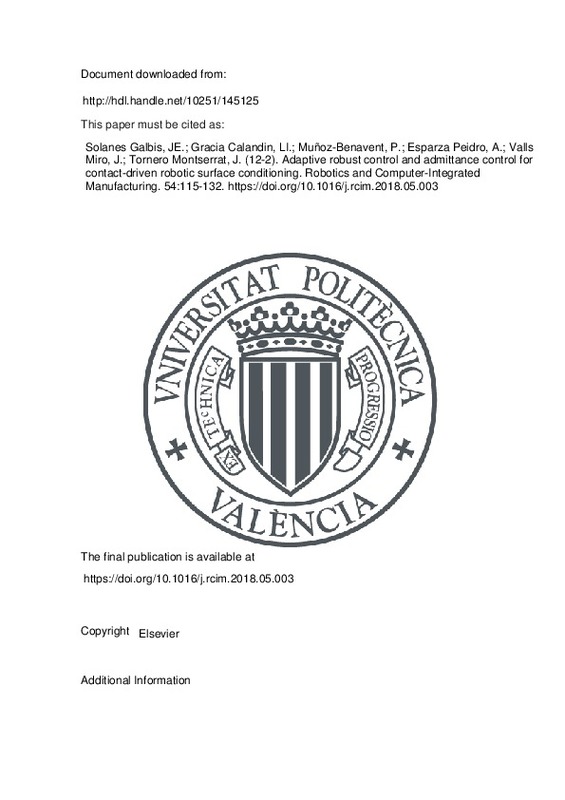JavaScript is disabled for your browser. Some features of this site may not work without it.
Buscar en RiuNet
Listar
Mi cuenta
Estadísticas
Ayuda RiuNet
Admin. UPV
Adaptive robust control and admittance control for contact-driven robotic surface conditioning
Mostrar el registro sencillo del ítem
Ficheros en el ítem
| dc.contributor.author | Solanes Galbis, Juan Ernesto
|
es_ES |
| dc.contributor.author | Gracia Calandin, Luis Ignacio
|
es_ES |
| dc.contributor.author | Muñoz-Benavent, Pau
|
es_ES |
| dc.contributor.author | Esparza Peidro, Alicia
|
es_ES |
| dc.contributor.author | Valls Miro, Jaime
|
es_ES |
| dc.contributor.author | Tornero Montserrat, Josep
|
es_ES |
| dc.date.accessioned | 2020-06-03T05:53:31Z | |
| dc.date.available | 2020-06-03T05:53:31Z | |
| dc.date.issued | 2018-12 | es_ES |
| dc.identifier.issn | 0736-5845 | es_ES |
| dc.identifier.uri | http://hdl.handle.net/10251/145125 | |
| dc.description.abstract | [EN] This work presents a hybrid position/force control of robots for surface contact conditioning tasks such as polishing, profiling, deburring, etc. The robot force control is designed using sliding mode ideas to benefit from robustness. On the one hand, a set of equality constraints are defined to attain the desired tool pressure on the surface, as well as to keep the tool orientation perpendicular to the surface. On the other hand, inequality constraints are defined to adapt the tool position to unmodeled features present in the surface, e.g., a protruding window frame. Conventional and non-conventional sliding mode controls are used to fulfill the equality and inequality constraints, respectively. Furthermore, in order to deal with sudden changes of the material stiffness, which are forwarded to the robot tool and can produce instability and bad performance, adaptive switching gain laws are considered not only for the conventional sliding mode control but also for the non-conventional sliding mode control. A lower priority tracking controller is also defined to follow the desired reference trajectory on the target surface. Moreover, the classical admittance control typically used in force control tasks is adapted for the proposed surface contact application in order to experimentally compare the performance of both control approaches. The effectiveness of the proposed method is substantiated by experimental results using a redundant 7R manipulator, whereas its advantages over the classical admittance control approach are experimentally shown. | es_ES |
| dc.description.sponsorship | This work was supported in part by the Spanish Government under the Project DPI2017-87656-C2-1-R and the Generalitat Valenciana under Grants VALi+d APOSTD/2016/044 and BEST/2017/029. | es_ES |
| dc.language | Inglés | es_ES |
| dc.publisher | Elsevier | es_ES |
| dc.relation.ispartof | Robotics and Computer-Integrated Manufacturing | es_ES |
| dc.rights | Reconocimiento - No comercial - Sin obra derivada (by-nc-nd) | es_ES |
| dc.subject | Robot force control | es_ES |
| dc.subject | Adaptive switching gain | es_ES |
| dc.subject | Sliding mode control | es_ES |
| dc.subject.classification | INGENIERIA DE SISTEMAS Y AUTOMATICA | es_ES |
| dc.subject.classification | ARQUITECTURA Y TECNOLOGIA DE COMPUTADORES | es_ES |
| dc.title | Adaptive robust control and admittance control for contact-driven robotic surface conditioning | es_ES |
| dc.type | Artículo | es_ES |
| dc.identifier.doi | 10.1016/j.rcim.2018.05.003 | es_ES |
| dc.relation.projectID | info:eu-repo/grantAgreement/GVA//BEST%2F2017%2F029/ | es_ES |
| dc.relation.projectID | info:eu-repo/grantAgreement/GVA//APOSTD%2F2016%2F044/ | es_ES |
| dc.relation.projectID | info:eu-repo/grantAgreement/AEI/Plan Estatal de Investigación Científica y Técnica y de Innovación 2013-2016/DPI2017-87656-C2-1-R/ES/VISION ARTIFICIAL Y ROBOTICA COLABORATIVA EN PULIDO DE SUPERFICIES EN LA INDUSTRIA/ | es_ES |
| dc.rights.accessRights | Abierto | es_ES |
| dc.contributor.affiliation | Universitat Politècnica de València. Departamento de Ingeniería de Sistemas y Automática - Departament d'Enginyeria de Sistemes i Automàtica | es_ES |
| dc.description.bibliographicCitation | Solanes Galbis, JE.; Gracia Calandin, LI.; Muñoz-Benavent, P.; Esparza Peidro, A.; Valls Miro, J.; Tornero Montserrat, J. (2018). Adaptive robust control and admittance control for contact-driven robotic surface conditioning. Robotics and Computer-Integrated Manufacturing. 54:115-132. https://doi.org/10.1016/j.rcim.2018.05.003 | es_ES |
| dc.description.accrualMethod | S | es_ES |
| dc.relation.publisherversion | https://doi.org/10.1016/j.rcim.2018.05.003 | es_ES |
| dc.description.upvformatpinicio | 115 | es_ES |
| dc.description.upvformatpfin | 132 | es_ES |
| dc.type.version | info:eu-repo/semantics/publishedVersion | es_ES |
| dc.description.volume | 54 | es_ES |
| dc.relation.pasarela | S\373635 | es_ES |
| dc.contributor.funder | Generalitat Valenciana | es_ES |
| dc.contributor.funder | Agencia Estatal de Investigación | es_ES |







![[Cerrado]](/themes/UPV/images/candado.png)

